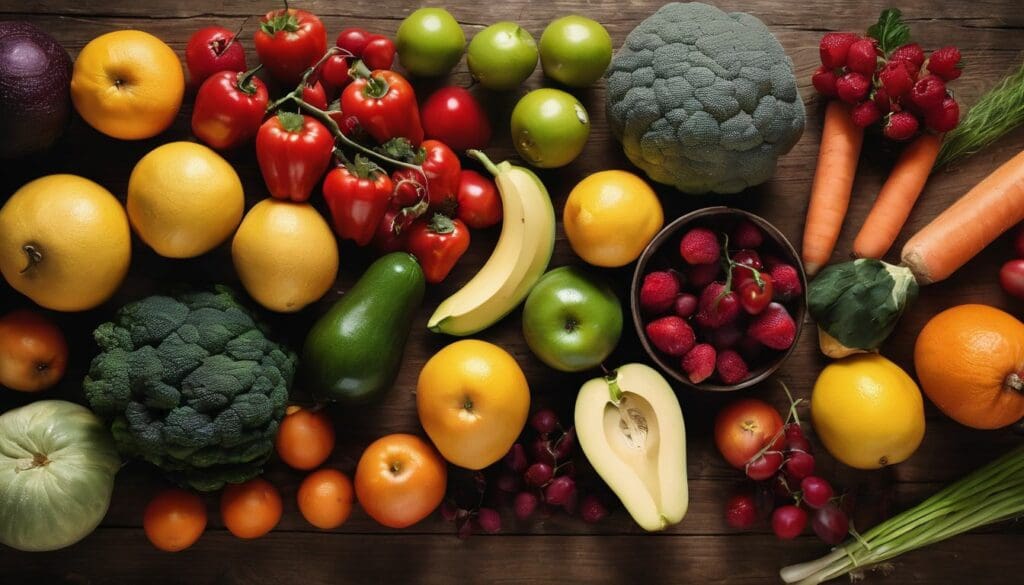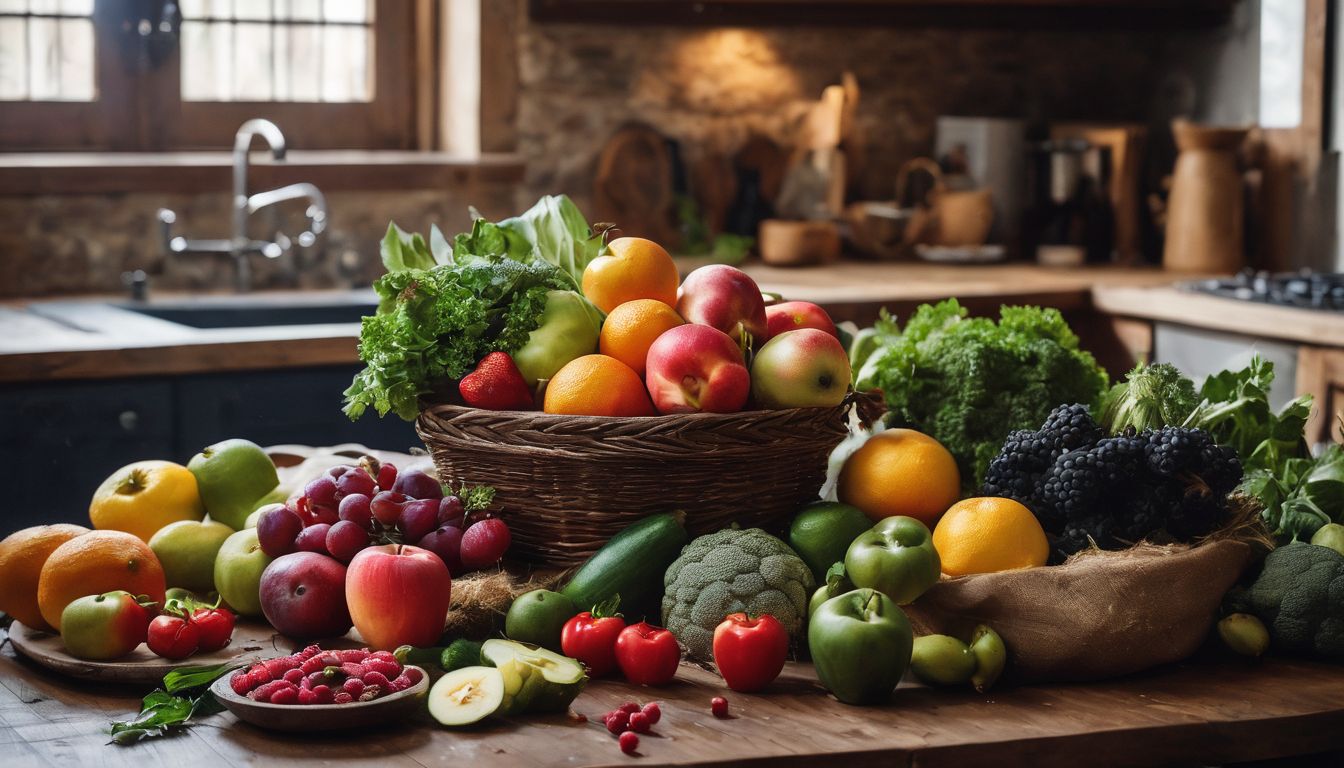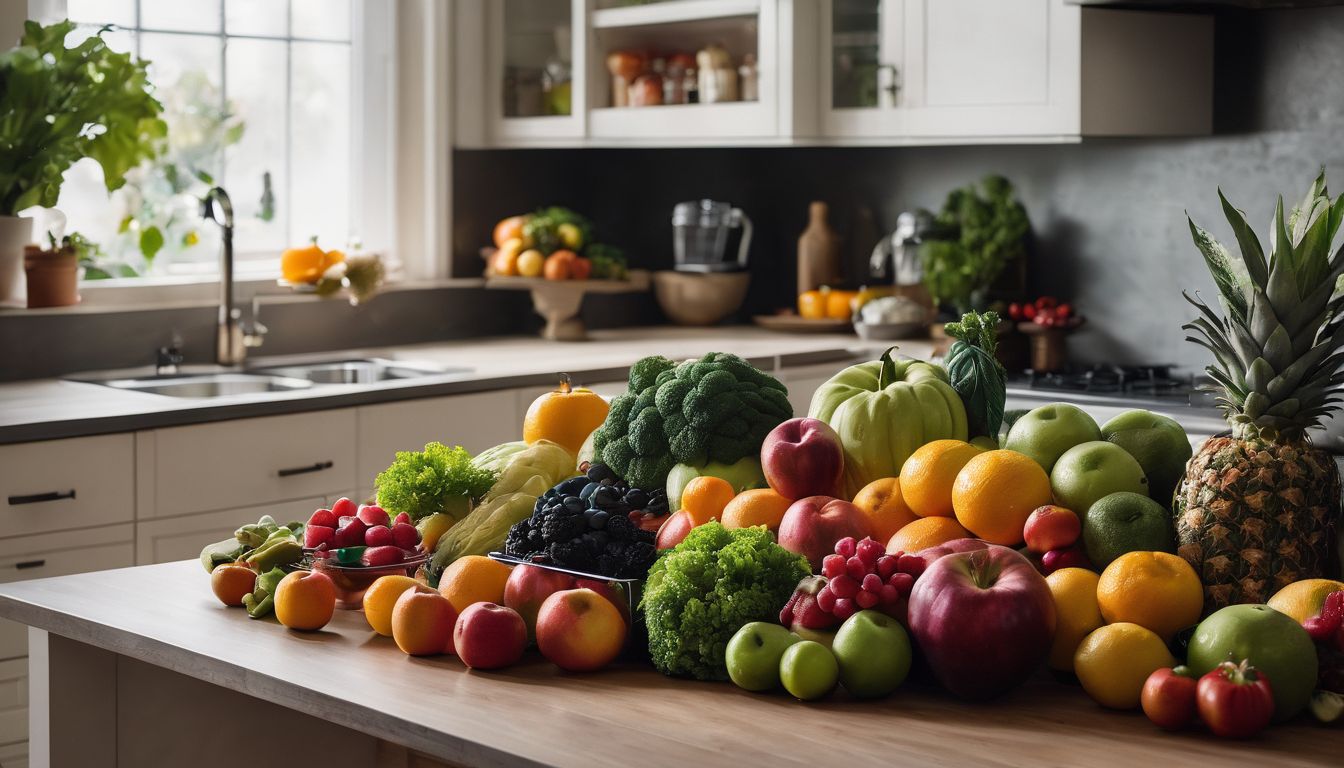Are you puzzled about what munching on an apple or snacking on spinach can do for your health? Consider this: eating a colourful array of fruits and vegetables gives your body a spectrum of essential nutrients.
Our blog will guide you through the forest of produce to unveil the treasures hidden in each bite, from crunch-worthy carrots to antioxidant-rich berries. Dive into nature’s basket with us!
Key Takeaways
- Eating a colourful range of fruits and vegetables provides essential nutrients like vitamins, minerals, and fibre that can lower the risk of chronic diseases such as heart disease and cancer.
- It’s important to consume at least five portions or 400 grammes of different coloured fruits and vegetables daily to benefit from their unique health-promoting properties.
- Fruits and vegetables rich in dietary fibre aid digestion, help maintain a healthy weight, boost the immune system, and increase satiety which assists with portion control during meals.
- Proper selection, handling, storage, and preparation of produce maximise nutrient retention while supporting sustainable environmental practices like reducing food waste.
- Fresh fruits are best consumed on an empty stomach for optimal absorption of nutrients while both fresh and frozen options provide valuable health benefits; choosing local seasonal produce helps reduce environmental impact.
Importance of Fruit and Vegetable Intake
Fruits and vegetables play a crucial role in a healthy diet, providing essential nutrients and dietary fiber. Including them in your meals can lower the risk of chronic diseases and contribute to overall well-being.
Role in a healthy diet
Vegetables and fruits are fundamental to a nutrient-rich diet, packed with vitamins, minerals, and dietary fibre essential for maintaining a healthy body. They supply the phytochemicals our systems need to function optimally.
Eating a variety of colourful produce maximises these benefits since different colours often signify unique nutritional values that together support heart health, bolster eye health, and can even lower blood pressure.
Including these plant-based foods in daily meals not only prevents chronic diseases but also plays a crucial role in cancer prevention. The abundance of nutrients found within fruits and vegetables makes them powerful allies in sustaining overall well-being.
Their inclusion in your diet aids digestion due to high fibre content while providing ample energy through their natural sugars – all vital components for anyone advocating environmental conservation by choosing what sustains both personal health and the planet’s resources.
Rich in nutrients
Fruits and vegetables are rich in essential vitamins and minerals, providing the body with a range of nutrients necessary for overall health. These nutrient-rich foods contain dietary fiber, which promotes digestive health and helps maintain a healthy weight.
Additionally, fruits and vegetables are abundant in phytochemicals that act as antioxidants, protecting the body from disease-causing free radicals.
The variety of colours in fruits and vegetables indicates the presence of different nutrients essential for our well-being. Consuming a diverse range of fruits and vegetables ensures that you benefit from an array of health-promoting properties unique to each type.
Lower risk of chronic diseases
Consuming a variety of fruits and vegetables can lower the risk of chronic diseases such as heart disease, type 2 diabetes, and certain cancers. The essential vitamins, minerals, antioxidants, and dietary fiber found in these nutrient-rich foods help to protect the body from oxidative stress and inflammation while supporting overall health.
Incorporating a colourful array of fruits and vegetables into your diet not only boosts nutritional benefits but also plays a crucial role in disease prevention.
By regularly including nutrient-rich fruits and vegetables in your diet rich in nutrients, you are providing your body with an array of health-promoting properties that work together to reduce the risk of chronic diseases.
Daily Recommendations for Fruit and Vegetable Intake
The recommended daily intake of fruits and vegetables varies depending on age, gender, and level of physical activity. It is generally advised to consume at least 5 portions or 400 grams of fruits and vegetables per day to support overall health.
Serving sizes
Understanding the appropriate serving sizes of fruits and vegetables is crucial for maintaining a balanced diet. Here’s a simple table to guide you:
| Fruit or Vegetable | Serving Size |
|---|---|
| Apples | 1 medium apple |
| Bananas | 1 medium banana |
| Carrots | 1/2 cup chopped |
| Broccoli | 1/2 cup cooked |
| Leafy greens | 1 cup raw |
| Berries | 1/2 cup fresh berries |
| Oranges | 1 medium orange |
| Peas | 1/2 cup cooked |
| Sweet potatoes | 1/2 cup mashed |
| Tomatoes | 1 medium tomato |
Consistent servings can help in reducing food waste and ensuring you get a variety of nutrients daily. Opt for local produce to support sustainability and reduce carbon footprint.
Determining exposure in studies
When it comes to determining exposure in studies, researchers often measure the intake of fruits and vegetables by conducting surveys or collecting dietary data from participants. They factor in the quantity and frequency of consumption to assess how much individuals are exposed to the nutrients present in these foods.
This method helps to understand the impact of fruit and vegetable intake on overall health, including their potential role in preventing chronic diseases such as cancer.
Incorporating varied fruits and vegetables into one’s diet can have a substantial positive effect on health. Researchers use various methods to determine exposure levels, allowing them to draw connections between fruit and vegetable consumption and its influence on disease prevention.
Health Benefits of Specific Fruits and Vegetables
Specific fruits and vegetables offer a wide range of vitamins, minerals, and phytochemicals that can provide protection against chronic diseases. They also have an impact on satiety, helping to control cravings and maintain a healthy weight.
Vitamins and minerals
Fruits and vegetables are abundant in essential vitamins and minerals, which are vital for maintaining good health. They provide a wide array of nutrients that support various bodily functions. Here are the key vitamins and minerals found in different fruits and vegetables:
- Vitamin C: Found in citrus fruits, strawberries, kiwi, and bell peppers, vitamin C acts as an antioxidant that supports immune function and aids in collagen production for healthy skin.
- Vitamin A: Present in carrots, sweet potatoes, spinach, and mangoes, vitamin A is crucial for vision health, immune function, and cell growth.
- Potassium: Bananas, avocados, spinach, and potatoes are rich sources of potassium, which helps regulate blood pressure and supports muscle function.
- Folate: Leafy greens like spinach and kale along with fruits such as oranges contain folate, important for DNA synthesis and cell growth.
- Vitamin K: Broccoli, Brussels sprouts, and leafy greens provide vitamin K essential for blood clotting and bone health.
- Iron: While more prevalent in meat products, dark leafy greens like spinach also contain iron that is important for oxygen transport within the body.
- Magnesium: Avocados, bananas, nuts, seeds as well as leafy greens are excellent sources of magnesium contributing to energy production and nerve function.
Protection against diseases
Fruits and vegetables offer protection against diseases by boosting the immune system and providing essential nutrients to combat illness.
- Fruits and vegetables contain phytochemicals, such as flavonoids and carotenoids, which have protective properties against cancer and heart disease. These compounds act as antioxidants, neutralising harmful free radicals in the body.
- The high fibre content in fruits and vegetables aids in maintaining a healthy digestive system, reducing the risk of gastrointestinal conditions like diverticulosis and constipation.
- Consuming a variety of fruits and vegetables provides a wide range of vitamins and minerals that support overall health, helping to prevent deficiencies that can lead to various illnesses.
- Certain fruits like berries, oranges, and apples are rich in vitamin C, which strengthens the immune system and helps fight off infections.
- Leafy greens such as spinach and kale are packed with vitamin K, crucial for blood clotting and bone health, reducing the risk of osteoporosis.
Effect on satiety
After protecting against diseases, consuming a variety of fruits and vegetables also has an effect on satiety. These foods are rich in dietary fibre, which helps to promote feelings of fullness and satisfaction after eating.
Including fruits and vegetables in your meals can help you manage your appetite, making it easier to control portion sizes and reduce overeating.
Furthermore, the high water content in many fruits and vegetables also contributes to their ability to keep you feeling full for longer periods. This can be particularly beneficial for those looking to maintain a healthy weight or seeking ways to support their weight loss efforts.
Tips for Selecting and Preparing Fruits and Vegetables
When selecting fruits and vegetables, choose a variety of colours to ensure a diverse range of nutrients. Properly handle and store them to maintain their freshness and nutritional value.
For serving suggestions, explore different cooking methods and recipes to enjoy the health benefits of these nutritious foods. Read on to discover more ways to incorporate fruits and vegetables into your diet for overall health and wellbeing.
Choosing a variety of colours
Fruits and vegetables come in a wide range of colours, each corresponding to specific nutrients. Opting for an array of colours ensures that you benefit from the various vitamins, minerals, and phytochemicals found in different produce.
Including red, green, orange, blue/purple, and yellow fruits and vegetables in your diet provides a diverse array of health-promoting properties. For instance, red fruits like tomatoes and watermelon contain lycopene which is beneficial for heart health.
Meanwhile, dark leafy greens such as spinach are rich in folate and iron. By choosing a variety of colours, you ensure that your body receives an assortment of essential nutrients to support overall well-being.
Proper handling
- Store fruits and vegetables in a cool, dry place away from direct sunlight to prolong their shelf life.
- Wash fruits and vegetables thoroughly under running water before consumption or cooking to remove any dirt, bacteria, or pesticide residues.
- Use reusable produce bags or containers when shopping to reduce plastic waste.
- Avoid overstocking perishable items to prevent spoilage and food wastage.
- Consider composting fruit and vegetable scraps to minimise organic waste and support sustainable practices.
- Support local farmers by purchasing seasonal fruits and vegetables, reducing carbon emissions from transportation.
- Prioritise using whole fruits and vegetables, minimising food processing and packaging waste.
Serving suggestions
- Use reusable containers or beeswax wraps to store cut fruits and vegetables.
- Compost fruit and vegetable scraps to reduce waste and provide nutrients for your garden.
- Buy locally grown produce to support local farmers and reduce the carbon footprint associated with transportation.
- Serve fruits and vegetables in their whole form to minimise packaging waste.
- Opt for organic options when possible to reduce exposure to chemical pesticides.
- Create a seasonal meal plan based on what fruits and vegetables are in season, supporting sustainable farming practices.
- Incorporate fruits and vegetables into homemade smoothies or juices using reusable straws or bottles.
Common Questions and Myths about Fruit and Vegetable Consumption
– What are the differences between fruits and vegetables? Are they equally nutritious?
– Is the sugar content in fruits a concern for health?
– Fresh vs frozen options: which is better for nutritional value?
– When is the best time to consume fruits for optimal health benefits?
Difference between fruits and vegetables
Fruits are developed from the flower of a plant and often contain seeds, whilst vegetables consist of any other part of the plant, such as roots, stems, or leaves. This means that tomatoes, cucumbers, and avocados are all technically fruits due to their seed-bearing structures, despite being commonly referred to as vegetables.
On the other hand, carrots, potatoes, and lettuce are categorised as vegetables because they originate from non-reproductive parts of the plant.
Understanding these distinctions can help in making informed choices about dietary intake and also aid in sustainable practices by appreciating the unique aspects of various plants we consume.
Sugar content
Fruits and vegetables contain natural sugars, which contribute to their sweet taste. These natural sugars are accompanied by essential nutrients like vitamins, minerals, and dietary fibre.
When eaten in their whole form, the sugar content in fruits and vegetables is combined with other beneficial compounds that support overall health. The key is to consume a variety of fruits and vegetables to benefit from their nutrient-rich profiles while managing sugar intake effectively.
Some fruits have higher sugar contents than others; however, they also offer unique health benefits such as antioxidant properties that protect against chronic diseases. Vegetables generally have lower sugar contents compared to fruits but provide essential vitamins, minerals, and phytochemicals that contribute to disease prevention.
Fresh vs frozen options
Fresh fruits and vegetables are often picked at their peak ripeness, retaining their nutritional value. Frozen options, on the other hand, are usually frozen shortly after harvesting, preserving important vitamins and minerals.
Both fresh and frozen fruits and vegetables offer health benefits; however, fresh produce is perishable and may result in food waste. On the other hand, frozen options can be stored for longer periods without spoilage, reducing the environmental impact of food wastage.
To ensure a variety of nutrients while also supporting conservation efforts, consider choosing locally sourced fresh produce when it’s in season to reduce transportation emissions.
Best time to eat fruits
Fruits are best eaten on an empty stomach to maximise their nutritional benefits and aid digestion. Consuming fruits in the morning can provide a quick energy boost and help kickstart your metabolism for the day, thanks to their natural sugars and high fibre content.
Additionally, eating fruits between meals can prevent hunger pangs while providing essential vitamins, minerals, and antioxidants to support overall health.
It is advisable to consume fruits at least 30 minutes before a meal or two hours after a meal for optimal digestion and nutrient absorption. Moreover, incorporating seasonal fruits into your diet not only supports local agriculture but also reduces environmental impact by reducing food mileage.
Conclusion
In conclusion, incorporating a variety of fruits and vegetables into your diet can provide essential nutrients. Choosing a spectrum of colors ensures intake of different vitamins and minerals.
By understanding the health benefits, you can make informed decisions about your dietary choices. Remember to handle and prepare them properly for maximum benefits. Enjoy the diverse flavors and textures that fruits and vegetables offer!
FAQs
1. What nutritional benefits do fruits and vegetables offer?
Fruits and vegetables are packed with essential vitamins, minerals, dietary fibre, and phytochemicals that support overall health.
2. How can eating fruits and vegetables prevent disease?
Consuming a variety of nutrient-rich fruits and vegetables plays a critical role in preventing cancer by providing your body with health-promoting properties.
3. Why should we include different types of fruits and vegetables in our diet?
Including various fruits and vegetables in your diet ensures you get the full range of health advantages they offer, from boosting immune function to maintaining good digestive health.
4. What impact do fruits and vegetables have on my overall well-being?
The impact of nutrient-dense fruits and veggies on overall well-being is significant; they contribute to better heart health, stronger immunity, and can even improve mental sharpness.
5. Can the fibre in fruits and veggies help me feel better?
Yes! The dietary fibre found in many fruits and vegetables helps keep your digestion smooth which might make you feel more energised and help maintain a healthy weight.





